“Be on the lookout for a new generation.” 🎶
Wood fired bagel making workshop, Bundist political anthems, the catchiest Yiddish folksong with its freedom fighter roots -- the perfect festival for this political moment.
Last week I visited my dad, brother and sister-in-law in the Berkshires. My brother suggested we go to KlezCummington, a homegrown Yiddish festival of sorts happening the fourth of July weekend. He sent me the link to their website and I was pretty sold by their description of the festival as, “dedicated to the creation and deepening of Yiddish diasporic cultures, serving as a vibrant community hub for contemporary Yiddish performance, musical exploration, cultural transmission and learning, resilience, and joy!” Then I saw that one of the workshops was ‘pickles and wood fired bagel making’ so I was fully sold on the festival.
The large scale bagel and pickle making operations were amazing. Several dozens of us rolled the bagels, boiled them, got them seeded up and ready to be baked in an outdoor clay oven. It has been an often talked about fantasy for Matt and I that he might build a small outdoor oven to bake his weekly sourdough bread loaves and occasional pizzas, but it never occurred to me, until now, that I could bake my bagels in such an oven. (I made this reel to capture the experience, I can’t upload the full thing here, but you can see it on Instagram.)
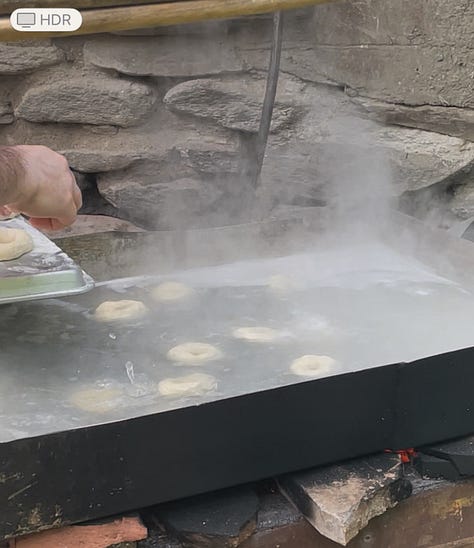
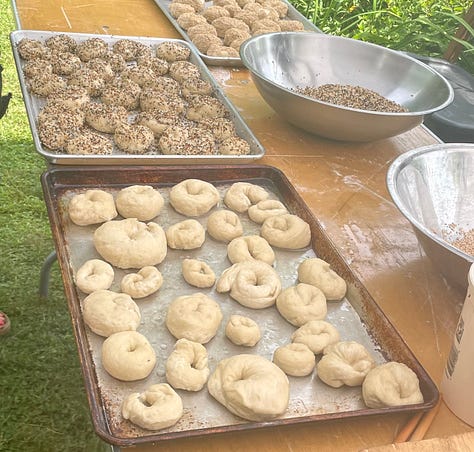
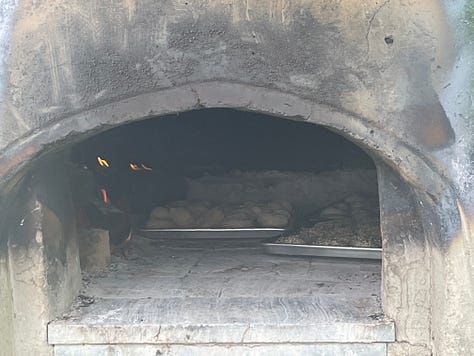
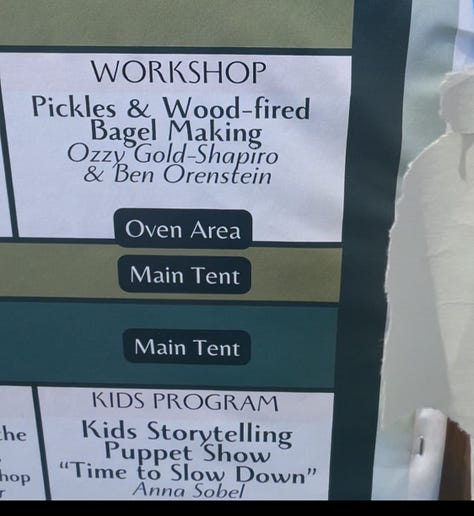

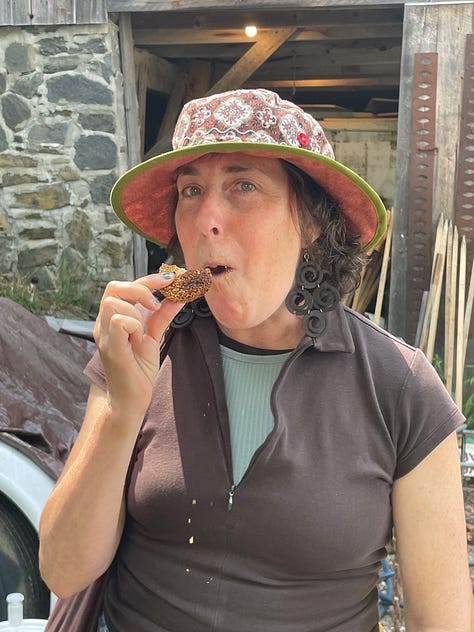
Landsmanshaftn
If all that happened on this sunny summer Saturday was being part of a bagel making workshop, eating homemade bagels and pickles with the sounds of a klezmer slow jam in the background, then dayenu (it would have been enough). But it was not just that. I felt emotionally nourished by the theme of the festival and the infectious energy of the thirty-something organizers. The theme for this year’s KlezCummington was Landsmanshaftn and mutual aid. I have been thinking a lot about both lately. My Midwest Bagel Quest led to to the David-Horodok landsmanshaftn, descendants from the shtetl where my grandmother grew up. (I wrote it about it here.) Landsmanshaftn were mutual aid societies organized by Jewish immigrants to support fellow immigrants that came from the same hometowns. When my grandfather died young, his Wysokie Litovsk landsmanshaftn gave my grandmother money to help her in those first rough months.
I really appreciated that the organizers of KlezCummington brought the teachings and history and music from the Yiddish Book Center oral archives to the festival (the workshop leader of landsmanshaftn across the globe had listened to my mom’s oral history which made me happy).
A musical symbol for freedom fighters
After the bagel spread lunch we had a midday concert. The woman leading the concert introduced the song, Der Yokh, which is one of those songs that has such a steady emotional energy to it, you feel like you are part of something larger when you sing it with a group. I had always thought of it as a Yiddish song, but turns out it started out as a Catalan anti-Franco song. L’Estaca was written in 1968 by singer-songwriter Lluís Llach as a call for unity and became a musical symbol for freedom fighters. In the early 1980s Polish singer-songwriter Jack Kaczmarski wrote new lyrics which was adopted by the Polish trade union and sung at protests; there was a Tunisian version sung at the 2011 Tunisian Revolution and a Belarusian one at the 2020 Belarusian protests. I was very familiar with the song, I had been humming the melody for decades and thought it was because of the Yiddish band The Klezmatics version Der Yokh. A Google search told me that couldn’t be true since they recorded it in 2016. My brother solved the mystery about why this song was so familiar, one of my favorite NYC bands from the 1980s, The Washington Squares, recorded Walls, their version of L’Estaca by way of Poland in the mid 1980s.
Listen to the original song | Louis Leach L’Estaca here.
Listen to The Klezmatics song | Der Yokh here.
List to The Washington Squares song | Walls here
Beloved, An Oath/Comrades in Struggle
One of the afternoon workshops was Yiddish Anthems, and I was pleasantly surprised that we were learning a Bundist anthem. I first learned of The Jewish Labour Bund when I was in my 20s. A very brief history lesson is that Bundism and Zionism were the two prevailing political philosophies for Jews in Europe in the late 19th century and early 20th century. The Bund’s central tenet was the idea of Doikayt ("hereness"), meaning wherever Jews lived is where they fought for freedom, fought to live in economic dignity, fought against anti-semitism. After the Holocaust, Zionism was the prevailing Jewish philosophy. Listening to our very talented workshop leader take us through a Bund anthem, both in English and in Yiddish, about lovers who are committed to each other, but also committed to defeating the Russian Tzar and Capitalism, was just the anthem I needed.
“Be on the lookout for a new generation.”
The organizers of KlezCummington, and most of the people that attended, were Jews in their thirties. It was really great to see the next generation learn about Landsmanshaftn, learn about Bundism and make it their own. I spent twelve hours with a farm full of Jewish people that were connecting through history and culture and language and music and bagels and pickles - and not through Zionism. The next day I took my dog for a walk and listened to the Washington Squares for the first time in a long time and put their song, “New Generation” on repeat. Back in the mid 1980s, when I felt like I was part of a New Generation, I listened to this song a lot and it made many of my late 1980s/early 1990s playlists. The song starts with, “So be on the lookout for a new generation, coming down strong, filled with inspiration. Be on the lookout for a new generation.” It was both moving and inspiring to be part of this community a younger generation of organizers created, filled with support, good bagels, and a catchy nigun. (Click the audio below to hear the nigun we were singing.)




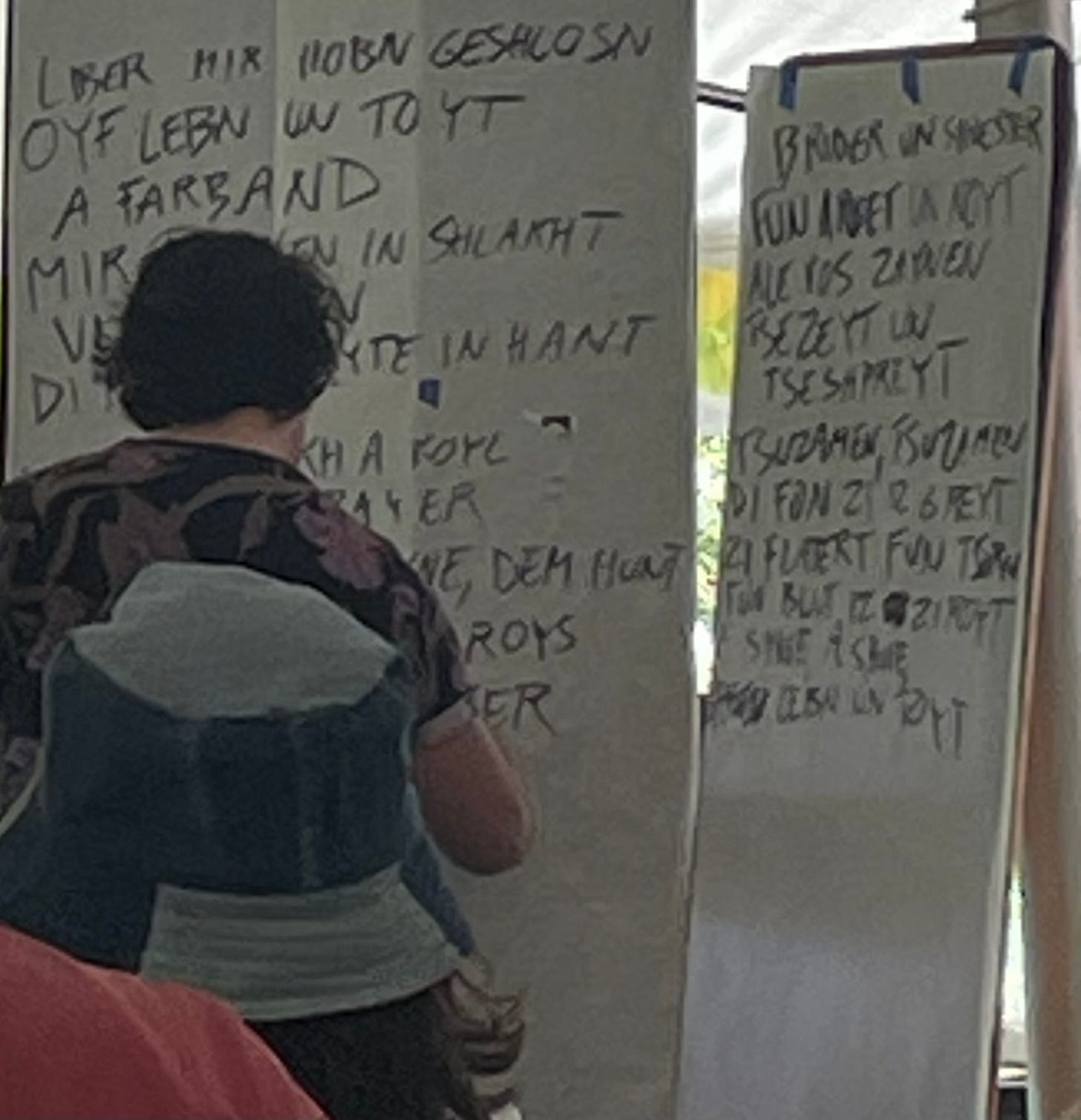
Every time I read your blog, I feel just a tad smarter. Thank you for that.